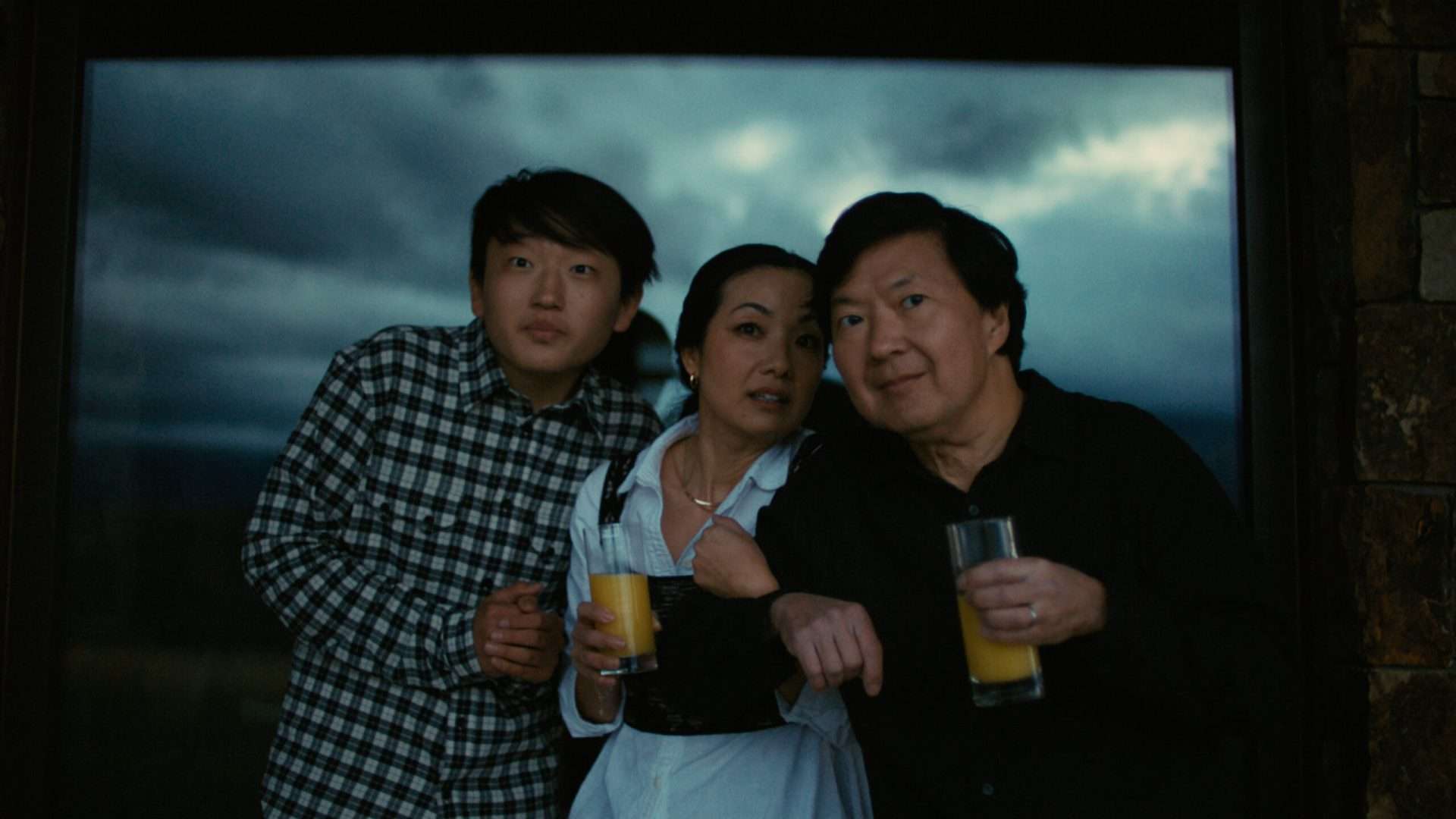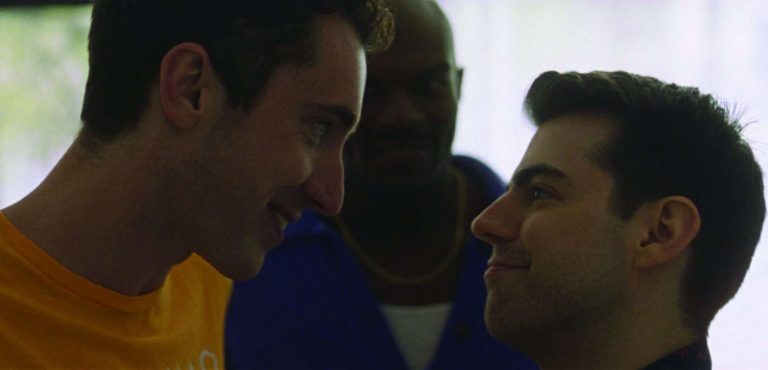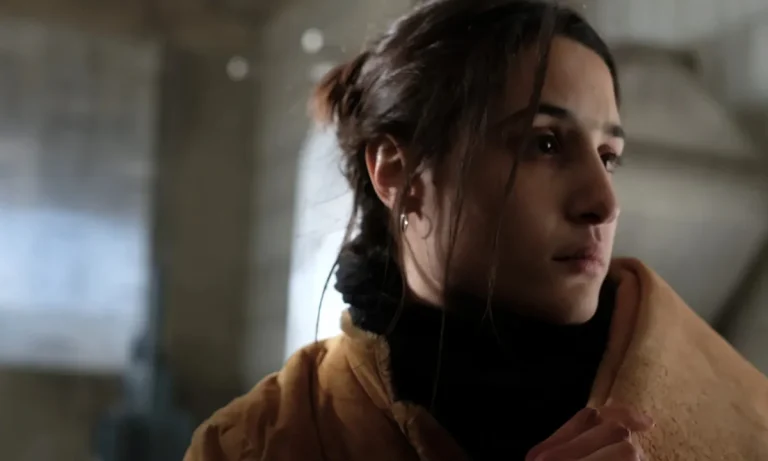Jean Shim’s “A Great Divide” follows a Korean-American family moving from San Francisco to rural Wyoming, looking for a fresh start. The family patriarch, Isaac Lee (Ken Jeong) receives an exciting job opportunity that pushes him to this transition. His wife, Jenna (Jae Suh Park), and their teenage son, Benjamin (Emerson Min) accompany him. They enter their new home, loaned by Isaac’s employer, and are mesmerized by how spacious and sleek it is. This is beyond their imagination and what they were used to. Shortly after their arrival, Benjamin’s close friend, Ellie (Miya Cech) arrives to spend time with them.
As ethnically East Asians, the four of them do not find anyone in Wyoming who looks like them. It doesn’t faze the parents since they have experienced that kind of alienation in their formative years. However, the kids find it hard to digest. The predominantly Caucasian population in the West does not treat them with dignity and joy as they are used to. They disparage the Lee family and see them as a threat to their livelihood. The narrative follows the family’s struggle to fit in this new environment along with the white population’s blatant superiority complex. It becomes evident through incredibly simple incidents that feel like nightmares for the family.
When Benjamin goes for a short walk with Ellie, they get scolded by George McNather (Jamie McShane), a local middle-aged man and an entitled bigot. McNather, who owns a large chunk of land in his town, behaves stereotypically racist like most of the population living there. But it’s not just adults. Even children are also hostile toward the family. Benjamin and Ellie face it first-hand from Benjamin’s new classmate, Hunter Drake (West Mulholland) besides the local officers. These locals use intimidation tactics to instill fear in these kids’ lives to make them consider leaving their small town. So, the family’s transition is bumpy for all the obvious reasons.
It’s not that the Lee family did not face any racism in their Californian neighborhood of the Bay Area. It just becomes unapologetically blunt in the Western heartland of America. Considering the results of the latest US elections, this subject has become even more pertinent and timely. From rejecting women’s bodily autonomy to refusing the basic rights of marginalized communities, the country’s right-wing resorts to any cheap tactic that can boost their fragile self-esteem.
Shim’s film does not limit itself to critiquing just the staunch conservatives excessively proud of their regressive beliefs. It also holds a mirror to the political centrists, who think the world is fair for everyone. They ignore the issues that do not directly affect them but are present for performative activism, which helps mainly to raise their self-esteem but nothing to help those in need. As the film often states: sometimes, good snakes and bad snakes look exactly alike.
Written by director Jean Shim with Jeff Yang and Martina Nagel, the script examines racism and xenophobia faced by the Lee family across three generations. It shows them being ridiculed, teased, or ostracized due to their identity. However, it largely uses its characters as vessels to make its larger point. Jenna appears more forthright when it comes to confronting racism while Isaac chooses to slide it under the rug. Ellie absorbs the experiences in Wyoming a bit differently than Benjamin.

While their arcs receive a bit more context, the other characters hardly receive any. They feel like mere stand-ins for similar real-life individuals and work as narrative devices to communicate what the writer hopes to. Since the film explores potent themes, the drama need not be subtle. Still, its demonstrative nature comes at odds with its human stories.
The film falters as it tries to balance its timely critique with a sentimental family drama. It oscillates between being a human drama about a family in a fish-out-of-a-water scenario and an unsparing critique of xenophobia. However, it fails to handle the tonal contrast effectively, which makes it seem awkward and contrived even in its most earnest scenes. Even the brilliant acting performances, mainly by Jae Suh Park, cannot save its sense of stagedness.
“A Great Divide” often shows its characters suddenly breaking into stories, sharing their past experiences to provide explanations for their present stances. While these stories serve a purpose and offer additional subtext, they appear a little too often to feel organic. This blunts its overall emotional impact despite the justified anger seething underneath. Still, as mentioned above, it features some fantastic performances by the central four actors. Ken Jeong surprises us with the nuance he offers to Isaac’s struggle after being known for his antics as a comedian. Jae Suh Park becomes the beating heart of the film, emoting the pain of feeling like an outsider for her entire life.



![The Blood of Wolves [2018] : ‘NYAFF’ Review](https://79468c92.delivery.rocketcdn.me/wp-content/uploads/2018/07/THE_BLOOD_OF_WOLVES_NYAFF_HOF1-768x512.jpg)


![Atlantics [2019] Netflix Review: A Glimpse into the Other Realm](https://79468c92.delivery.rocketcdn.me/wp-content/uploads/2019/12/atlantics-768x432.jpg)

![Annabelle Comes Home [2019] Review: More Fun Than Frightening](https://79468c92.delivery.rocketcdn.me/wp-content/uploads/2019/07/Annabelle-Comes-Home-1-768x432.jpg)